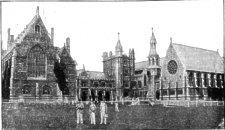
Great Hall Quadrangle Chapel
[From Ludgate Monthly vol VI #1 pp 61/70 Nov 1893]
Young England at School.
" Hæc Studia Oblectant."
VIEW FROM PLAYING FIELDS

Great Hall Quadrangle Chapel
IT was a most delightful day when our artist and myself decided to pay a visit to Clifton College, and, taking a cab to Paddington Station, we were soon in possession of a cosy corner in the famous Great Western Railway Company's main line train. To the tick of the clock the guard signalled the engine driver, and we were quickly dashing through the west Metropolitan suburbs. Slough, Twyford and Maidenhead were soon left behind, for we were truly travelling at a marvellous pace; but the wonderful ease and steadiness with which the carriage was running was quite misleading, and the rate at which we were covering the ground could be only estimated by the almost instantaneous rush we made through the intermediate stations. A slight pause at the great biscuit manufacturing town was soon followed by another at Swindon, from which we ran without a break to Bath. As we slowly approached the station, we could not help remarking upon the prominent position of the company's line in this lovely city, and the magnificent view the passengers obtain when travelling over the Great Western system through this district. Bath for a long time was the gayest of watering-places in the kingdom, and is still one of the most beautiful cities in Europe, nestling in a well-wooded valley, and built of fine white freestone, or oolite, obtained from quarries in the vicinity. The springs of Bath have been famous for many centuries, and are even said to have been known as far back as the first century to the Romans, who had a station there, called Aquæ Solis. Another ten miles brought us to our destination, a fine open station, which, as a structure, would rival some of our railway companies' headquarters in London.
Bristol is a noble cathedral city, one of the chief seaports in England, and a centre of Western commerce. Of the city we saw but little, for our destination was Clifton, or rather its noted College, which we soon reached by the aid of a four wheeler.
Clifton is a favourite residence of wealthy Bristolians : it is built on the sides and summit of lofty cliffs (from which it derives its name) of carboniferous limestone, overhanging the Avon, and rising, in St. Vincent's Rocks, to the height of three hundred and eight feet. The river, which is here navigable to the largest vessels, is spanned by a suspension bridge, seven hundred and two feet in length and having an elevation of two hundred and seventy-five feet above low water. This marvellous structure is better known to Londoners as the old Hungerford Bridge, which is supposed to have done good service years ago by striding our Father Thames. The mineral springs of Clifton and its beautiful scenery made it, as early as the eighteenth century, a favourite watering-place, which it continues to be, though I believe the spa has now declined in favour.
Cliftonians are indeed fortunate to receive their education in such a lovely, healthy and unique spot, considering they are in such close proximity to a large commercial city.
The College buildings, as will be seen from our illustration (showing the pile from the playing fields, which is the first view we got, coming from Bristol or from the Clifton Downs) are indeed grand and most imposing; and should you happen to visit On a half holiday, which was our luck, the whole College and grounds present a most animated spectacle, for the whole of these playing fields are covered with young and old Cliftonians, playful as kittens, the majestic group of building standing in the back-ground, rendering the picture one of noble importance.
Clifton College, which is only thirty years old, cannot boast of ancient associations or time-honoured traditions, n0 famous old carvings or desks and chairs bearing the names of statesman, generals or poets.
All these have yet to come, but in the comparatively short space of its existence it has built up a reputation that has placed it amongst the Public Schools of England.
Although previous attempts had been made to found a college in Bristol without success, Clifton College was founded in 1860 to meet an obvious need. In 1831 there was established a " Bristol College," and, considering its short career of only ten years, it turned out several distinguished scholars. As Bristol College closed its doors in 1841 a "Bishop's College " was opened, which also terminated after ten years, so that for some years there was no public school at Clifton.
In April of 1860 several influential citizens of Bristol, including the mayor of the city, John Bates, Esq. (who officiated as chairman), met in the house of Mr. H. S. Washborough, to consider the advisability of establishing a college at Clifton, which was the stepping-stone of the Clifton College Company, Limited.
The scheme received unanimous support and the Provisional Committee having satisfied themselves as to the possibility of purchasing the site (closely attached to the Zoological Gardens and consisting of twelve acres of land) on advantageous terms; a council was appointed; the deed of association prepared, and the company duly incorporated on September 13th, 1860.
Twelve months later, a preliminary school was opened under the Rev. T. H. Stokoe and Mr. Blackader, and thus a nucleus of a school was being formed, ready to be transferred to the new buildings as soon as they were opened.
The first Head-mastership fell to the lot of the Rev. C. Evans, previously the Fifth Form Master of Rugby, but shortly before the date fixed for the opening of the College, Mr. Evans was elected to the Head-mastershipof King Edward's Grammar School, Birmingham, where he had himself been educated. His resignation was read with the greatest regret, but a worthy substitute was found in the Rev. John Percival, M.A., who had also held an assistant mastership at Rugby and who after an absence of twenty-five years from his old school, now holds the reins of office at Rugby.
The College was formally opened on Tuesday, September 30th, 1862, at 11a m. The boys numbering sixty, occupied the front benches at the opening service in the big school, assisted by the Cathedral choir. The Head-master preached a most effective sermon to a vast congregation of friends of the College, and thus was Clifton Educational Establishment launched on, what has now proved its successful career.
The executive were no doubt fortunate in obtaining the services of Dr. Percival, for it is mainly due to his unceasing hard work and self-privations that the College has been placed on the sound basis that it now occupies. Although suddenly called to take office, Dr. Percival soon obtained the respect and regard -of both masters and boys. The school, in the short space of two years, quadrupled its numbers, and continued steadily to increase; means of more fully satisfying modern requirements in scientific and other teaching he suggested, and were added, the library, the museum, and other valuable educational appliances were provided (some at Dr. Percival's own cost), and, in short, every means were taken towards obtaining for the school ample breadth and the highest excellence in education; and that not for a passing advantage, but with the full purpose of securing for those under his care the best possible training, and for the College the definite and assured position of a great public school.
After sixteen years' hard work with most valuable results at Clifton, Dr. Percival was offered, and accepted, the post of President of Trinity College, Oxford, and such a great loss, it can be readily understood, was deeply felt by the Council. Still, fortune smiled on the College, for the seat vacated by so faithful a master as Dr. Percival was most fittingly occupied by the Rev. James Maurice Wilson, late fellow of St. John's College, Cambridge, who had passed a distinguished University career (being senior wrangler in 1859), and had been most prominent as a successful teacher and house-master at Rugby. Mr. Wilson, proved a most popular master, and his name will ever remain a monument in Cliftonian history.
Mr. Wilson had the love of all at the College; and to follow such a ruler we can imagine was no easy task.
This, however, fell to the lot of the Rev. M. G. Glazebrook, M.A., who has now been in office two years, and bids well to prove quite equal to the occasion. When I arrived at the College I soon found myself ushered into the presence of the principal, who made us most heartily welcome.
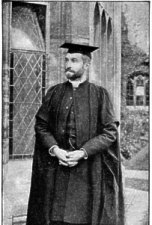
Rev M.G. Glazebrook, MA, headmaster
Mr. Glazebrook, who, by the way, brought with him an excellent reputation from Manchester Grammar School, personally conducted me over part of the school, and throughout the school-House where he resides and cares for some seventy-five boarders. With pride, I was shown the neat and pretty studies of the boys, together with the house dining-hall, dormitories, and last, but not least, the unique little sick-rooms and house library.
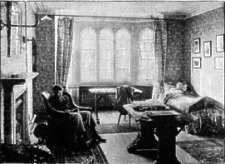
Sick room in School house
From the affectionate terms in which Mr. Glazebrook spoke to me of both his assistant-masters and the boys under his charge, it was very evident he was taking most kindly to the Collega and those around him ; and with this vein running through the whole school, it can only be expected that Mr. Glazebrook's term of office should be as successful as his predecessors'.
 Group of Masters |
 Detail T. E. Brown |
The most important event in the history of the college is, unquestionably, the granting to the college of a Royal Charter. The success attained by the college made it apparent to the Council that, if it was to maintain its position as a public school :nd be secure against its revenues being used as a source of proprietary profit, it was pressingly necessary that some great change should take place in its constitution. The shareholders surrendered such proprietary rights as they possessed for the permanent benefit of the college. Op March 13th information was received that the Charter had gone to the Home Office for completion, and that the warrant to affix the Great Seal had been signed by Her Majesty. The Charter, which bears the date March 16, 1877, was shortly afterwards received, bringing with it a great change in the status of the school.
A new scheme was drafted by which the following should be the main lines of new constitution
1. A new college to consist of Life Governors and Donors, on a plan similar to that which has proved eminently successful
at Marlborough.
2. A payment of £50 to be the qualification of the Life Governors.
3. The Life Governors to elect the governing body, and to enjoy during life the privilege (not transferable) of always keeping
one boy as nominee in the College, it respect of each £50 subscribed.
4. Donors of £15 or £20, as may be determined, to have the right of nominatin; one boy for each donation.
5. The Council to have power to admit boys at an extra fee of £5 per annum in lieu of a donation
.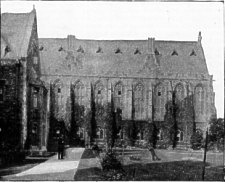
Great hall and school house from Head-master's garden
The oldest portions of the School buildings are those shown in our view taken from the Head-master's garden, the School-house and Big School, which, with an open fivescourt, were considered sufficient to start the College. A few years later, during a hard frost, the roof of Big School caught fire from a wooden plug left in one of the chimneys. by dint of great efforts of masters and boys the fire was got under without much damage ; but many old Cliftonians, no doubt, well remember this little incident.
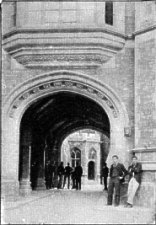
Archway to quadrangle
How this College has grown during the past thirty years can be well imagined from our illustrations. Take for instance, the view of the College from the playing fields. The Head-master's house, or School house, we miss here, as the group commences with Big School. Attached to these, we now find a beautiful pile of buildings connecting the Big School and the East Wing and Chapel, known as the Percival Buildings, built and dedicated to the memory of Dr. Percival's association with the College ; these provide class rooms on the ground floor, and cloisters ; while the floor above is wholly devoted to the Library and Museum, which are both very excellent ; the former, well stocked with literature, and with a capital bust by Woolner of Dr. Percival, the donor of the Hall, is a favourite retreat for the elder boys; while the latter is unique in its arrangements and contains a valuable collection of curiosities.
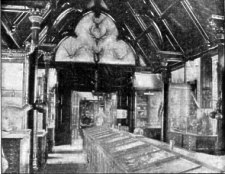
Museum and Library
At the end of the Percival Buildings and adjoining the east wing, stands proudly and prominently, the Wilson tower. As will be seen from the illustration, it is a very fine piece of architecture, while inside it is equally handsome. It was named after the second Headmaster, who was himself a very generous contributor, and was subscribed for by masters and old Cliftonians.
The tower contains three rooms, the topmost being a science lecture-room, more commonly known as the " Crow's Nest ; the middle is apportioned as the sixth form room, very handsomely panelled in walnut, while the lower one is devoted to the Council.
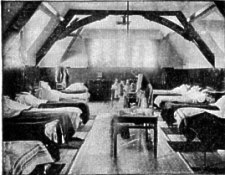
A dormitory
The Chapel is, perhaps, one of the most important buildings in our group, inasmuch as it was graciously given to the Council by a widow lady, Cargline Guthrie, in memory of her husband, the Rev. John Guthrie, M.A., Vicar of Colne and Canon of Bristol, the first Chairman of the Council of the College.
Mrs. Guthrie laid the foundation stone of the building, December, 1865, but her charitable act she did not live to see completed, as she died the following April ; so that it remains a joint memorial of her who gave it and him whose name it was intended to honour. The interior compares most favourably with the best school chapels, after Eton, and in many instances out-rivals them ; and should the proposed scheme be carried out to still enlarge it, I doubt if any other public school chapel will compare with Clifton for second honours.
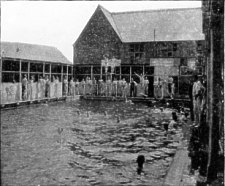
Swimming Bath
Like other schools, Clifton has its Armoury, Racquet Courts, Gymnasium, Bat Fives-courts, large swimming-bath (open), grub shop, work shops and confectioner's shop.
The chemical laboratories and lecture room are all much as at other schools, while the drawing school finds a place over the porter's lodge and "grub shop," and the junior school at the rear of the chapel
|
.
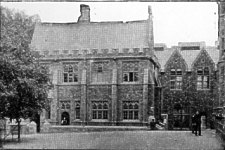 Tuck Shop |
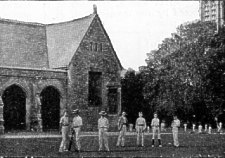 Junior's Quarters |
One great feature at Clifton is the town boys' quarters, a small but ample building divided to accommodate the south town and the north town residents, or " townites." By meeting every day, formally and informally, in their town rooms, and thus having much intercourse with one another, they have by now acquired the status and the united feeling of an ordinary boarders' house. To each house there is a master to superintend. The day boys are subject to all the same rules, as to locking-up times and bounds, as the boarders, and this, together with the town rooms, keeps them together and out of the mischief that surrounds boys who live in such large towns as Bristol.
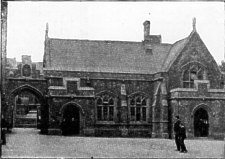
Town boys Rooms
At Clifton, however, the townites earn an equal position with the boarders, whereas at some schools the boarders look down upon day-boys.
A very important school institution is that of evening preparation. A certain number of boys are allowed to prepare their work in their studies. This privilege depends upon a boy's form and weekly place in the form ; the rest have preparation in the house hall, under the superintendence of a preparation-master. This duty is undertaken partly by the house-tutor.
The resident house tutor has from the first been an institution in the School House. His duties are to assist the House Master generally; but more particularly, to take share in the preparation, and to take special charge of some private pupils,
As other houses were established, their masters had to get help for the preparation.
In course of time, the Preparation Master thus introduced, developed into a resident house tutor.
The tuition is something very different from that which exists at most other schools-Eton, for example. At Clifton, nearly the whole of a boy's working time is spent in school with Form, or Set Masters, consequently there is no time for additional or co-ordinate work done with the tutor. Attempts have from time to time been made to assimilate Clifton tuition, in this respect, to that of Eton or Rugby; but the stress of work infallibly tends to confine the tuition within the limits of additional preparation for form or set work in school.
This tuition is paid for by the Headmaster. Every house has attached to it non-resident tutors, who assist in the ordinary evening preparation, or take pupils in subjects which need special attention; as may be directed by the House-master.
This system of tuition has been, to some extent, adopted in the Town Houses. It will be seen, therefore, that every boy at Clifton, besides his Form-master and Set-master has a tutor, but that the functions of the tutor differ very materially from those of tutors at other public schools.
Although, as I have previously mentioned, there is very little that is historical, there are some very important and some very peculiar institutions at Clifton. Amongst the most important, I might mention the Musical Society, Choir, Literary Society, Engineer Corps, and the various athletic combinations.
The two most peculiar institutions are the "Sixth Form," and the "Football Caps."
The Clifton Sixth Form appear to me to have more power over their juniors and one another than at any other school; in fact the Sixth Form, and not the masters, govern the whole school. Any offence, that is not of the most serious nature, is punished by them, either singly or in a body, and they are permitted to inflict corporal punishment, and even should they themselves offend, punishment is not inflicted by the masters, but, as a body, they punish each other. A regular number of "fags " is assigned to each Sixth Form boy, and to him these fags come for help in any of their work, performing in return for hits the usual duties of a fag. The Sixth Form have a great many duties, and great many privileges. They have to keep up to a high standard of work themselves, and at the same time to govern the school and help others to work. Perhaps their greatest privilege is being allowed to go out of bounds without leave ; and aother of almost equal importance is that of sitting up later in the evening (the regular hour for bed being ten o'clock).
The games commenced with football at Clifton in 1862, and as we are now in the thick of this game, and with the willow laid aside, it is only right I should take this department of sport first.
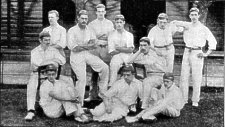
C. BONHAM CARTER.
H. R. CROSTHWAITE. W. G. GRACE. J. H. CURTIS. E. O. TAGART. A. S. JACKSON.
J. H. F. MILLS. G. HUDLESTON.
W. W. VAN SOMEREN. J. R. ECCLES. G. L. TOWNSEND.
I soon made myself acquainted with the football captain, A. S. Jackson, who was chatting away to me, and at the wine time supporting Wilson's Tower, while our artist photographed the archway leading under it to the chapel and playing fields.
" Mr. Jackson, I should like you to give me some slight explanation of your system of ' football caps,'" I remarked to my young friend Well, the idea originally came from Rugby, though I expect by this time our system and that of Rugby are in many respects different. We have, strictly speaking, no school football colours. There is no school fifteen, but for each house there is a special cap."
" Who has the giving of the caps ? " I enquired.
" When the head of a house thinks an vone in his house is worth his I cap," he goes to the head of the school and the representative of football, and asks their opinion. Should the two latter be of his opinion, the ' cap' is awarded.
Twenty-two caps are given on an average each year, and fifteen of these (not necessarily the same fifteen) repre sent the school in all its matches. The head of the school in work is ex officio captain of football, the object of this being to keep the control of the football in the hands of the Sixth Form."
" He who has had his 'cap' longest, is representative of football, and is supposed to represent the interests of football on the Big Side Levëe, or School Parliament."
"Big Side Levëe is also a somewhat curious institution, is it not ? "
" Rather," was the reply. " It is composed of representatives of the School, and decides all athletic questions.
" The head of the School, the representative of football, the captain of the cricket eleven, the captain of the engineer corps and the holder of the challenge cup for running are all ex officio members. Then each House has a representative and all the higher forms."
Of course I had previously heard that a son of the famous W. G. was a popular young cricketer at Clifton, and had barely finished with Mr. Jackson, as the football man of the college hailed a tall young man, wearing glasses, by the name of Grace, and introduced me to the Captain of the School cricket. W. G. Grace, jun., I found particularly pleasing and unpretentious, most willing to help in any way possible or stand up for any amount of press boring. Should he only keep these good points, and achieve the brilliancy of his respected parent as a cricketer, he will make many friends.
Taking last season as a whole, Grace considered his eleven had been fairly successful, and quite up to the standard of previous years, although most brilliant victories were once or twice followed by unaccountable breakdowns. Let this be as it is, the record stands well, as out of nine principal contests, five resulted in `wins, two were drawn and two lost.
The eleven was constituted of some very promising young cricketers, two having been selected to play for Gloucestershire in the Clifton and Cheltenham cricket festivals-Grace and Townsend.
J. H. Curtis heads the list of averages with thirty-one runs per innings and a top score of one hundred and eleven. He is a brilliant bat, an excellent field, and bowls with success as a change bowler.
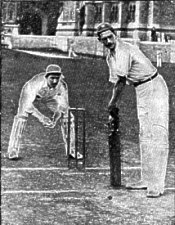
W.G. Grace junr batting.
Captain of Clifton XI
W. G. Grace should make a useful cricketer at Cambridge, for his all-round play at Clifton has proved him an exponent of no mean order. He takes second place in the batting statistics, and heads the bowling with fifty-one,wickets, costing only 11-9 runs each.
He is a thorough disciplinarian, and has earned the respect of all his school-mates.
Little C. L. Townsend is the wonder as a bowler, for he has not only terrorised the public school cricketers, but some of our best county batsmen have had to acknowledge themselves beaten by the little Cliftonian.
Clifton boasts of a very excellent Rifle Corps, which has shone on many occasions at the Public Schools Camp. This past summer term will, no doubt, be remembered by its members, as full of interest, and especially the pleasant field day at 'Marlborough, the Corps having been invited to take part in the programme of celebrating the jubilee of that institution.
The remaining branches of sport such as fives, racquets, paper chases, gymnastics and swimming, are all prominent features of the Cliftonian's pastime, and I regret not being able to give a few particulars regarding them, as each and every one are equally interesting in themselves. But about these, I trust when our School Chat opens again, the Cliftonian leaders of the various branches of games will send up some "jottings" that will interest our readers of "Young England at School."
CHAS. SARGENT.
The Illustrations are from a splendid set of Photographs specially taken for, the LUDGATE MONTHLY by Mr. R W. THOMAS, 41, Cheapside, London, E.C., from whom copies of the Originals can be obtained.
|
|
||
|
Any comments, errors or omissions
gratefully received The
Editor HTML Transcription © F.Coakley , 2009 |
||